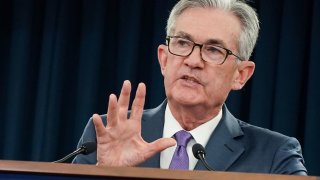
- Fed Chairman Jerome Powell expressed little worry about inflation and provided no indication of policy changes ahead.
- Bonds and stocks both sold off on the comments.
- Inflation is poison for bonds as it causes rising yields and falling prices.
- Inflation lowers the value of future interest payments on bonds.
The bond market sold off Thursday when Federal Reserve Chairman Jerome Powell expressed little worry about inflation and provided no indication of policy changes ahead.
In an exchange with The Wall Street Journal, the central bank leader acknowledged that an economy recuperating from the depths of the Covid-19 pandemic could see some price pressures ahead.
Get South Florida local news, weather forecasts and entertainment stories to your inbox. Sign up for NBC South Florida newsletters.
But he also dismissed them as mostly "base effects." In other words, prices in the next couple of months will look high, but only when compared with last year, just as the pandemic was beginning and inflation pressures fell through the floor.
In addition to indications of full employment, Powell said, "We'd want to see inflation sustainably above 2% and we'd want to be on track for inflation to run sustainably above 2%."
"There's just a lot of ground to cover before we get to that," he added.
Money Report
Bond markets sold off during his comments, sending yields higher, as prices and yields move in opposite directions. Stocks also tumbled, with the Dow industrials down more than 600 points.
Inflation is kryptonite for the bond market for a few reasons.
First, inflation erodes the capital of bonds as rising yields struggle, and generally fail, to keep up with price pressures. Rising yields mean falling prices.
Further, if inflation rises, that means future interest payments one receives for holding the bond are worth less.
Powell said the recent leap in yields was "notable and caught my eye," but didn't sound any alarm. Instead, the Fed chairman said he would be concerned only by "disorderly conditions" in the market, which he did not indicate to be the case even though yields are at the highest levels since before the pandemic began.
Even if inflation does rise, Powell and other Fed officials say they are content to let it run above their 2% target until the jobs market shows a full and inclusive recovery along income, gender and racial lines.
Wall Street was looking for some indication of policy tweaks from the Fed. Rather than seeking rate hikes, some economists and investors are looking for the central bank to change the composition of its monthly asset purchases.
One option would be to sell short-term bills and buy longer-dated notes in an effort to raise yields on the short end and lower them further out in duration to flatten the yield curve, in a process known as Operation Twist.
Investors worry the Fed may again have to play catch-up by hiking rates when inflation does occur. Stock market investors also don't like rising interest rates as they make it more expensive for companies to borrow and endanger debt-laden companies that have become dependent on low rates.
"With respect to financial conditions, it will be up to the Fed on whether they tighten further. The more dovish they get in the face of market expectations of higher inflation, the more financial tightening we'll see," wrote Peter Boockvar, chief investment officer at Bleakley Advisory Group.
Boockvar added that Fed officials "have put themselves in a tough situation" and must hope that inflation does not hit the 2% target before employment also reaches their goal.
"If it does, they have a problem because they will be afraid to confront it with higher rates if they remain so focused on employment," he said.






